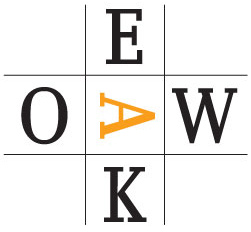Research trip 2017 – Gdansk: The whole 20th century in just one city
He as a “revolutionary” sees how often houses are torn down to build new ones and sometimes this is even more beautiful than the old. Europe, this wonderful idea and especially its core countries – France, Italy, Germany – may be prepared to offer something new in case the European Union breaks up because of Poland and Hungary, says the first revolutionary of peaceful change in East Central Europe in the late 1980s. Such a moment remains in the memory of everyone who is interested in the balance between East and West as the members of EOWA are. Suddenly Lech Wałęsa is standing in front of one: with orange ball goggles, which apparently sharpen the vision, grey jacket, plain blue tie, somewhat stocky.
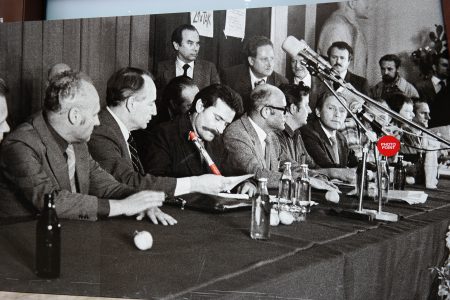
Gdansk Agreement, 31.8.1980 – The day he made history – Lech Wałęsa
The face has changed, the hair and moustache are white, and yet it is this world-famous face of the revolutionary who, in the 1980s at the Gdansk shipyard, from a work injection, had proclaimed the workers’ revolution against the Polish Communist Party, thus heralding the end of the Iron Curtain.
The prepared circle with chairs in a seminar room of the Solidarność Museum in Gdansk was changed again without further ado before this meeting. Performance Lech Wałęsa:

Was demonstrating in the evening with K.O.D. – Lech Wałęsa © EOWA
The man loves frontal teaching. And then it’s off during the five-day study trip of the European East-West Academy in September 2017. “Go on, ask questions”, says Lech Wałęsa, full of energy. He is looking for an exchange of blows and yet gives a lecture, questions and answers whizzing across the net like tennis balls.
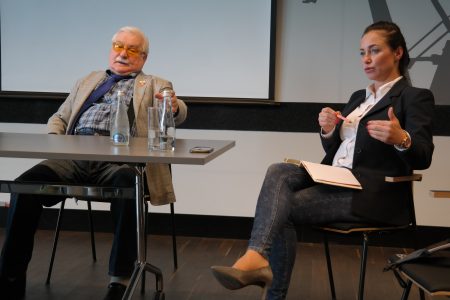
Lech Wałęsa with Kasia Tuszczynska © EOWA
The current anti-German and anti-European government in Poland? “This is the stupidest thing that could have happened,” says Wałęsa. Poland is doing well economically, the country is developing in the right direction, he says and probably means above all the everyday life of his fellow countrymen, what he is actually interested in. “I don’t even know myself who I should vote for. I’m not going to vote,” he says, no longer revealing himself, but feeling at one with his fellow countrymen: “More than 50 percent didn’t even go to the polls.
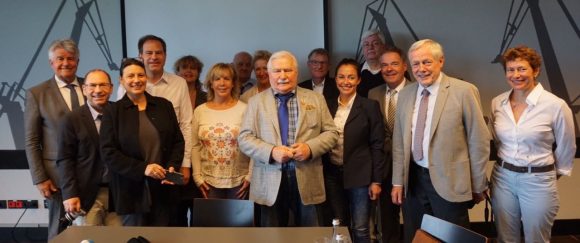
Group picture with Nobel Prize recipient Lech Wałęsa © EOWA
The place of conversation has its very own magic: the Gdansk Solidarność Museum is both an exhibition and event venue. A museum temple that combines all kinds of culture.

A place of meetings of all kinds – The Solidarność Museum from the inside © EOWA
The large foyer is also a concert hall and is surrounded by the exhibition areas: The beginning of the Solidarność movement, a former ceiling crane from the shipyard hall. In the penultimate room there are also photos of the showdown. The communist party of Poland has fallen – even before the end of the SED regime in East Berlin – and around the round tables sit such luminous figures as Lech Wałęsa, the later post-reunification Prime Minister of Poland, Tadeusz Mazowiecki, and suddenly this disturbing photo of the Lech brothers and Jarosław Kaczyński, the current leader of the right-wing populist, anti-European Polish ruling party PiS.

The Solidarność-Museum © EOWA
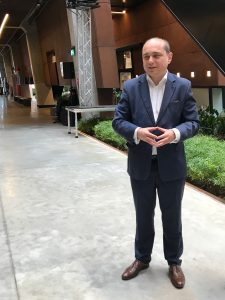
Solidarność Museum Director Basil Kerski © EOWA
This five-day educational trip to Gdansk is marked by such moments and is best summarized by the director of the Solidarność Museum, Basil Kerski.
The well-known analyst of Poland from the peaceful revolution of the 1980s until today is thoughtful. One thing is new about the current political situation, he says. “The principle is simple,” says Basil, “the complex is no longer in demand.” Not even with the Catholic Church, which has always been a pro-European stability factor, “today it falls out for it. It is a feeling of floridity on the one hand and enthusiasm for the cultural and political richness of Gdansk on the other that characterises this journey.

Commemoration at the Westerplatte 1.9.2017 © EOWA
This will include a visit to the commemoration of the anniversary of the beginning of the Second World War at Westerplatte, next to the ghetto of Warsaw, cities like Wroclaw and Krakow and of course Auschwitz perhaps one of the most important fixed points of European history of the 20th century in Poland. The way leads from the central station by tram and bus to the park of Westerplatte. There are security checks because the head of state is there. There are queues in the middle of the night. And yet, a few hundred people let this go to be part of the moment. Everyone who wants to can lay a wreath and be called out. And then there is a moment which again triggers deep reflection: the Mayor of Gdansk is a member of the liberal civil rights platform of the current President of the European Council Donald Tusk, the former liberal-conservative Prime Minister of Poland. But the guards of state representatives all see themselves in fierce opposition to the landlord: former Prime Minister Beata Szydlo stands there next to her ministers and President Andrzej Duda.

Interview with the Mayor of Gdañsk Pawel Adamowicz © EOWA
Even at this moment of mourning for the dead and the world war started by Hitler Germany, there is no moment of unity. Later in the morning it becomes clear what is behind it. “Remember that not all of Poland is called ‘Law and Justice’,” says Pawel Adamowicz, Mayor of Gdansk, during the interview. “This was not a normal change of power, we are dealing with a precedent.” And they will overcome it “like a disease or puberty.” Eastern Europe shows how the “soft power” of the EU has eroded over the past ten years. The increased size of the eastward expansions has not, as many had hoped, led to an increase in strength. For this reason, as in the 1990s, the question of the internal state of affairs at the heart of the EU is once again urgently needed. With the Treaty of Lisbon, the “Europe of different speeds” has been given a treaty basis: No EU state must prevent others from moving forward and working more closely together. With the Treaty of Schengen and the eurozone, this Europe of motorways and roads is already a reality. So it is obvious to take the next step now and at least from the core countries of the Euro zone, which already bear the main burden within the ESM system, to form the United States of Europe, starting with the fusion of financial and economic policy, democratically legitimized by another chamber of the EU Parliament elected by majority vote by the EU citizens of the participating core states.

Museum of the Second World War – brand new and already politically controversial © EOWA
Europe’s problem has always been that of “centre and periphery”, says Hungarian sociology philosopher and Holocaust survivor Agnes Heller. Another shining figure from Europe’s Middle East. With the election of Emanuel Macron as French president, there is the possibility of expanding this centre and recharging it with new energy. Danziger thoughts: “Even the periphery, especially in Eastern Europe, would at some point no longer be able to escape this. Because a new generation is currently emerging from the universities there, for whom the benefits of European integration are a living reality. At the April demonstrations in Budapest, as previously at the pro-European protests against the corrupt post-communist leadership elite in Bucharest, there were numerous people in their mid-twenties who do not want to support the new populism in Eastern Europe, who for example have long been accustomed to studying elsewhere in the EU. Their number alone is apparently not enough to send the old elites into retirement. For the next ten years these young Europeans in the East need a political sounding board to which they can appeal: The united states of core Europe. Emmanuel Macron is the first generation X of those born in the early 1970s to have the European project in their political hands. It is the Erasmus generation, who almost ten years ago had to watch their peers in the debtor countries of southern Europe, in Spain and in Portugal pack their suitcases at home in increasing desperation – beyond the special case of Greece.

Günter Grass near his birthplace © EOWA
Gdansk: World War, Westerplatte, Wende and Wałęsa. Quite a lot at once. Literary relaxation is good for that. The house where Günter Grass was born is one of them.
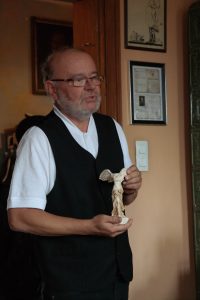
Pawel Hülle – writer and friend of Günter Grass © EOWA
But above all the visit to Pawel Hülle, who himself – there is no other way in Gdansk – was once a Solidarność comrade-in-arms and now lives a stone’s throw away from the beach of Sopot. It is an almost two-hour conversation as one imagines it with a European writer (Weiser Dawidek/1987, Castorp/2004): About work and future, but above all about the origin of his work: “General Jaruzelski helped me to become a writer. The martial law in Poland, as with so many in this country and especially in this Kashubian Gdansk, has tickled the resistance. It is a biography of hiding and writing, of the turnaround and of living on. What is a right-wing populist government in Warsaw?

Pawel Hülle shows us his ancestors © EOWA
What’s missing? An ending. But it is short: Whoever lives in a community, says the revolutionary Lech Wałęsa, “has rights and duties”. It is about “making this Europe finally”, says the revolutionary. And chases the last tennis ball over the net: “Are there any more questions?” Frank Hofmann
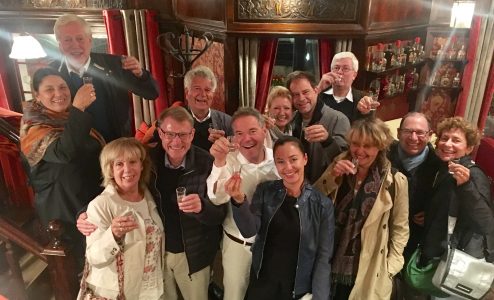
A sip of golden water as a farewell – Do widzenia Gdańsk! © EOWA
